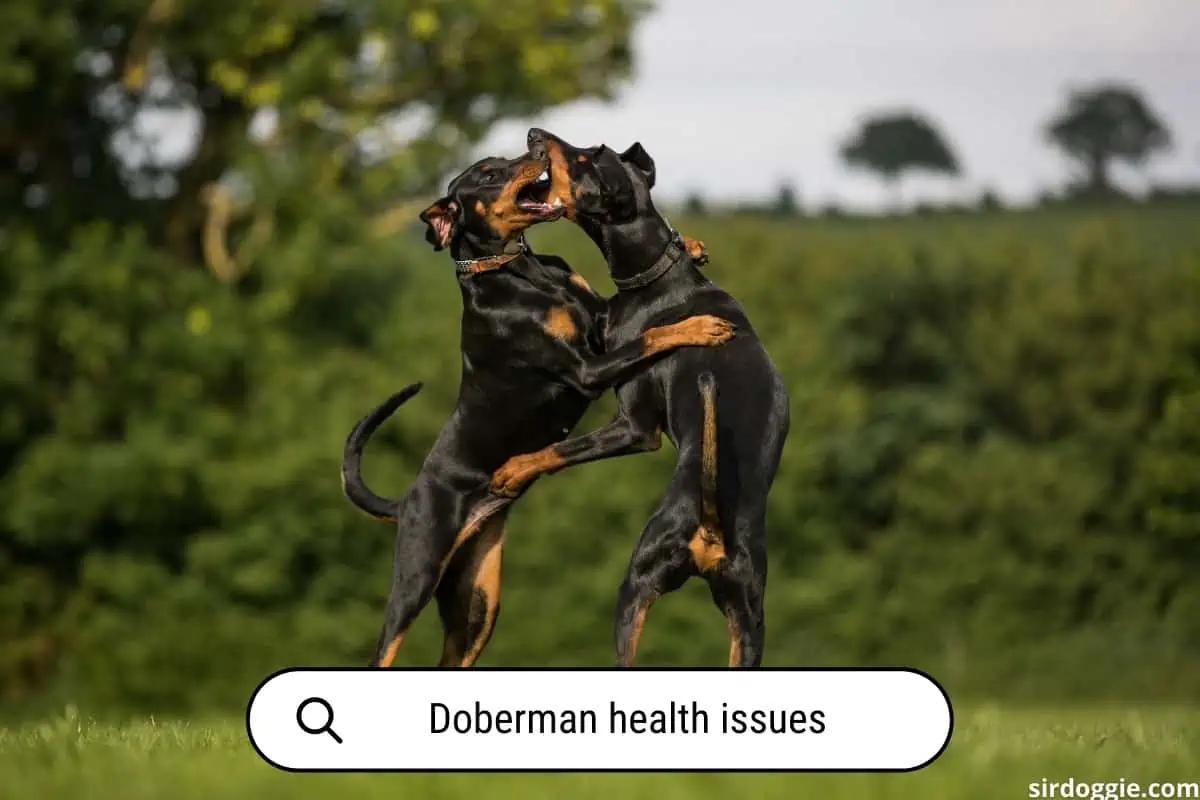Do Dobermans Get Separation Anxiety? (7 Symptoms)
Dobermans are a popular breed of dog that are known for their loyalty, intelligence, and protective nature. However, some owners may be concerned about whether their Doberman will experience separation anxiety when left alone.
Separation anxiety is a common issue among dogs, and Dobermans are no exception. This condition can cause dogs to become anxious, destructive, and even aggressive when they are left alone for extended periods of time.

While not all Dobermans will experience separation anxiety, it is important for owners to be aware of the signs and symptoms so that they can take steps to prevent or manage the condition.
What is Separation Anxiety?
Separation anxiety is a behavioral issue in dogs that causes them to become anxious or stressed when they are separated from their owners or left alone. This can lead to destructive behavior, excessive barking, and other unwanted behaviors.
Dogs with separation anxiety may exhibit symptoms such as pacing, drooling, panting, and attempting to escape from their confinement. They may also become destructive, chewing on furniture or other objects, or even harming themselves in an attempt to escape.
While any dog can develop separation anxiety, some breeds are more prone to it than others. Dobermans, in particular, are known to be highly attached to their owners and can become anxious when left alone for extended periods of time.
Dobermans and Separation Anxiety
Signs of Separation Anxiety in Dobermans
- Excessive barking or howling: Your Doberman may bark or howl persistently when you leave the house or when they sense you’re about to leave.
- Destructive behavior: In your absence, your Doberman may chew on furniture, destroy household items, or scratch at doors and windows in an attempt to escape.
- Accidents indoors: Even if house-trained, a Doberman with separation anxiety may have accidents inside the house when left alone.
- Pacing: Your Doberman may pace restlessly back and forth near the door or window, waiting for your return.
- Drooling or panting: Anxiety may cause your Doberman to drool excessively or pant when they sense you’re about to leave or while you’re away.
- Anorexia: Your Doberman may refuse to eat when left alone, even if they are usually food-motivated.
- Over-attachment: Your Doberman may follow you everywhere and exhibit signs of distress when they cannot be near you, even for short periods.
If you notice these signs of separation anxiety in your Doberman, it’s essential to address the issue through training, behavior modification, or professional help to ensure their mental well-being and prevent damage to your home.

Symptoms of Separation Anxiety in Dobermans
Dobermans are loyal and affectionate dogs, and they tend to form strong bonds with their owners. However, this can make them prone to separation anxiety when left alone for long periods of time. Some common symptoms of separation anxiety in Dobermans include:
- Excessive barking or whining
- Destructive behavior, such as chewing or digging
- Pacing or restlessness
- Loss of appetite or excessive drooling
- Attempts to escape or break out of confinement
Causes of Separation Anxiety in Dobermans
Separation anxiety in Dobermans can be caused by a variety of factors, including:
- Lack of socialization or training
- Changes in routine or environment
- Previous abandonment or rehoming
- Genetics or temperament
Preventing Separation Anxiety in Dobermans
While separation anxiety can be difficult to treat, there are steps that owners can take to prevent it from developing in the first place:
- Gradually acclimate your Doberman to being alone
- Provide plenty of mental and physical stimulation
- Establish a consistent routine
- Avoid making a big deal out of arrivals and departures
- Consider crate training or using a pet sitter or dog walker
Managing Separation Anxiety in Dobermans

Behavioral Training
One of the most effective ways to manage separation anxiety in Dobermans is through behavioral training. This involves teaching your dog to be comfortable with being alone for short periods of time, gradually increasing the duration as they become more comfortable.
Some techniques that can be used include:
- Desensitization: Gradually exposing your dog to being alone for increasing amounts of time, starting with just a few minutes and gradually building up to hours.
- Counter-conditioning: Associating being alone with positive experiences, such as giving your dog a treat or toy when you leave.
- Distraction: Providing your dog with toys or puzzle feeders to keep them occupied while you are away.
Medications and Supplements
In some cases, medications or supplements may be necessary to manage separation anxiety in Dobermans. These can help to reduce anxiety and make it easier for your dog to cope with being alone. THESE CAN ONLY BE PRESCRIBED BY VETS! There is good reason for this, as the effects and danger are HIGH.
Some commonly used medications and supplements include:
| Medications | Supplements |
|---|---|
| Fluoxetine (Prozac) | L-Theanine |
| Clomipramine (Clomicalm) | Valerian root |
| Diazepam (Valium) | Chamomile |
Environmental Changes
Making some simple changes to your dog’s environment can also help to manage separation anxiety. These can include:
- Creating a safe and comfortable space for your dog to be alone in, such as a crate or a designated room.
- Leaving your dog with items that have your scent on them, such as a shirt or blanket.
- Using white noise or calming music to help soothe your dog while you are away.

Conclusion
Dobermans are intelligent, loyal, and energetic dogs that require an adequate amount of exercise and attention. They are prone to developing separation anxiety, which can cause destructive behavior and distress for both the dog and the owner.
There are several ways to prevent or manage separation anxiety in Dobermans, including providing them with plenty of exercise, mental stimulation, and socialization. Crate training and desensitization techniques can also be effective in reducing anxiety and preventing destructive behavior.
It is important to note that every dog is unique and may require a different approach to managing separation anxiety. Consulting with a veterinarian or a professional dog trainer can be helpful in developing a personalized plan for your Doberman.
Overall, it is possible to manage separation anxiety in Dobermans with patience, consistency, and a willingness to adapt to your dog’s individual needs.

Family Dog Expert Author
Hi there! I’m Stuart, a devoted dog lover and family dog expert with over a decade of experience working with our furry companions. My passion for dogs drives me to share my knowledge and expertise, helping families build strong, loving bonds with their four-legged friends. When I’m not writing for SirDoggie, you’ll find me hiking, playing with my beautiful dog, or studying music.